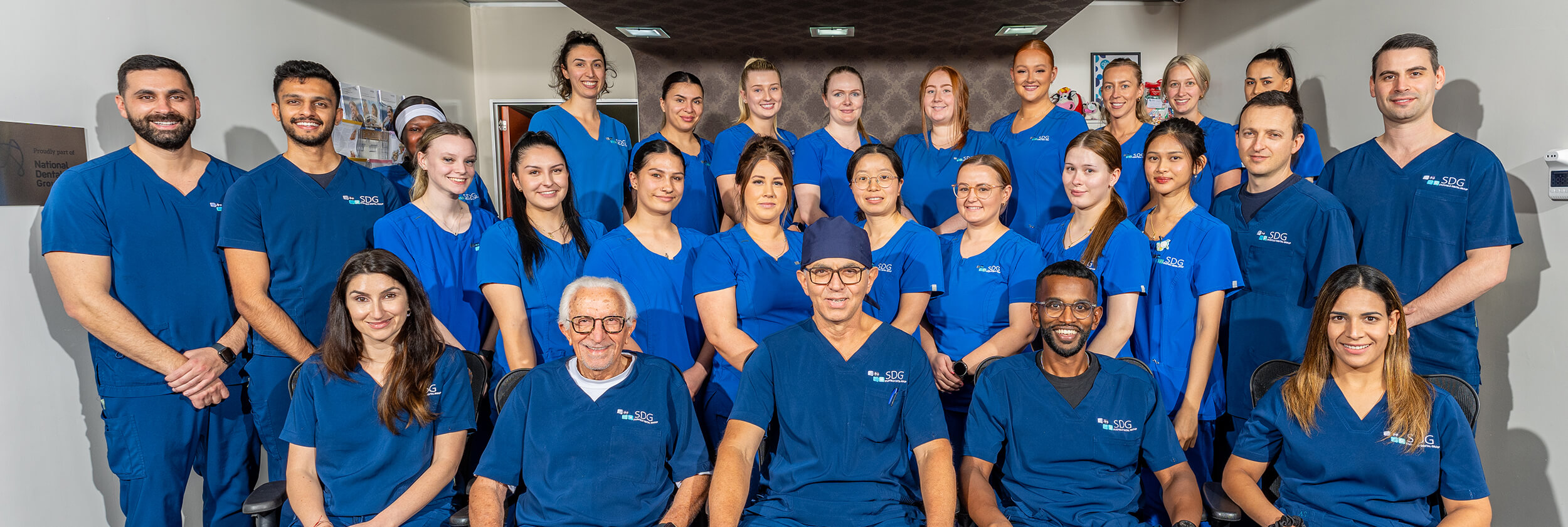
Wisdom Tooth Removal
Do you need wisdom teeth removal?
Wisdom teeth are the rear molars (back teeth), which usually come through around the late teens or early 20s. These teeth can be a valuable asset to the mouth when they are healthy and properly aligned, but often, they are misaligned and require removal. As problems such as tooth decay and gum infections can occur in the long run, it is usually best to have problematic wisdom teeth taken out sooner rather than later.
There are instances where the wisdom tooth comes through at an angle and pushes into the gum or the tooth beside it due to lack of space. This is called impaction. An impacted wisdom tooth can damage other teeth and cause pain and discomfort when chewing. Sometimes, wisdom teeth only partially break through the gums. This is called partial eruption. This can create a passageway that can become a magnet for bacteria, leading to infections and gum disease. Wisdom teeth can also push other teeth out of alignment, leading to crowding and potential damage to adjacent teeth. We recommend extracting your wisdom tooth in these cases to relieve and lower the risk of plaque buildup.
Do you need wisdom tooth extraction?
An impacted wisdom tooth can increase your risk of other unpleasant dental conditions. Moreover, they may be harder to clean since they are located towards the back of your mouth. Below mentioned are some complications that can arise:
- Infection of adjacent gum tissue
- Dental decay of adjacent teeth
- Crowding of front teeth
- Formation of cysts (in rare cases)
- Pain as a result of the wisdom teeth erupting against other teeth
- Risk of gum disease
- Pain in the jaws
- Difficulty chewing and eating
- Red, swollen, or bleeding gums
- Bad breath or an unpleasant taste in the mouth
If your wisdom tooth is causing problems, it may be best to have it removed. In some cases, an emergency wisdom tooth extraction may be necessary. Regular dental visits, good oral hygiene, and prompt intervention can help with early detection and effective management of these issues. Our experienced dentists will first assess your oral health and recommend the best solution for your smile.

How it works
Here’s a quick overview of what your wisdom teeth removal treatment will look like.
- In your initial consultation with our dentist, we will conduct a thorough evaluation of your teeth to get an understanding of your oral health. This will help determine if extracting your wisdom tooth is necessary.
- After a physical examination, we may recommend x-rays to accurately see the position of your wisdom teeth. Once it’s done, we will devise a personalised plan for your wisdom tooth removal.
- Our dentist will begin administering local anaesthesia to numb the area. You will remain awake during the procedure, but any discomfort will be minimised.
- The treatment begins with our dentist making a small incision in the gumline near your wisdom tooth using a specialised set of tools. Depending on how it has erupted, the tooth might need to be removed portion by portion.
- After removal, the affected area will then be cleaned with antiseptic to remove any bacteria that have accumulated over time. Once cleaned, the incision will be stitched back. Sterile dental gauze will be placed over the affected area in order to encourage clot formation & stop the bleeding so it heals naturally.
Can I be asleep during the procedure?
Worried about wisdom tooth removal being painful? We offer different sedation options and general anaesthesia to make, your procedure as comfortable and seamless as possible. All the equipment you would find in a hospital is on-site to ensure your safety throughout the anaesthetic process and it is supervised by our experienced specialist anaesthetist to make sure your health is in the safest hands.

Risks of Wisdom Tooth Extraction Surgery
As with all surgical procedures, there are general and specific risks associated with the extraction of wisdom teeth that depend on several factors. Any possibility of risk will be discussed in detail during your consultation with one of our highly experienced dentists after a thorough evaluation of your teeth. However, if you are eligible, rest assured that you are trusting a dental practice that has decades of experience.
Stress-free wisdom tooth removal at SDG
Wisdom Tooth Removal Aftercare
After the wisdom tooth removal process, it is common to experience some pain and swelling as the anaesthetic wears off. While that’s normal, our dentist will educate you about how to care for your mouth and ensure a smooth recovery after your wisdom tooth removal. Here are some important recommendations to consider after your procedure:
- Take pain-relieving medication if needed (based on advice from our oral health professionals)
- Place a cold compress over your face if you experience swelling.
- Hold warm salty water in your mouth. Do this after meals and no earlier than 24 hours after surgery.
- Eat soft, easy-to-chew foods (such as mashed potatoes or soups) for the next few days and avoid spicy/hard foods or beverages that are either too hot or too cold.
- Don’t smoke for 48 hours after the surgery.
- Avoid alcohol.
- Avoid rinsing your mouth aggressively.
- Staying hydrated is crucial. However, be cautious and avoid using straws for at least a week, as the suction can dislodge the blood clot that forms in the extraction site.
- Give your body the rest it deserves and avoid strenuous activities that could dislodge the blood clot.
- Be gentle and careful when brushing your teeth.
- Experiencing discomfort in the days following your wisdom tooth removal is normal. However, if you experience excessive bleeding after a couple of days, fever or swelling, we recommend scheduling an appointment with our dentist.
By following these guidelines and the specific advice given by our dental team, you can help promote a quicker and more comfortable recovery.
Our gentle and experienced dentists will make sure that you leave our practice knowing all the steps you need to have a safe recovery at home after your wisdom tooth removal at SDG Dental, Wantirna. Quick measures like ice packs and prescribed pain medication can help with recovery. Lots of rest and a soft food diet are recommended.
Cost of Wisdom Tooth Removal in Wantirna
There are several factors influencing the cost of your wisdom tooth extraction. The type of sedation used and the complexity of your case are two of the main factors. To get an accurate breakdown of the cost of treatment, we recommend you visit us for a consultation.
Why Choose SDG For Wisdom Teeth Extraction?
At SDG Dental, our dental professionals have extensive experience performing wisdom tooth extractions, including emergency wisdom tooth removal. We will ensure your comfort throughout the procedure using gentle and safe wisdom teeth removal techniques. We are committed to providing you with the highest quality dental care possible.
Our dental professionals are well-trained and experienced to provide a comprehensive range of treatments, such as teeth whitening, TMJ disorder treatment and family dentistry. No matter what your dental problem is, we’re here to help. Contact our friendly team to learn more.
FAQs
1. Why do I need to remove my wisdom teeth?
Wisdom teeth often cause issues due to lack of space in the mouth for them to erupt properly. They can become impacted, causing pain, infection, and possible damage to your adjacent teeth. This is not just uncomfortable but detrimental for your oral health and overall well-being so it’s best to have your wisdom teeth removed.
2. Is wisdom teeth removal painful?
The procedure is performed under local or general anesthesia by our highly experienced dentists, so don’t worry, you won’t feel pain. Some discomfort and swelling are normal after the procedure, but this can be managed with pain medication and a cold compress placed against the affected area.
3. What is the recovery period?
Typically it takes about 3-5 days to recover to some extent. By the end of the first week, you should feel mostly normal again.
4. What are dry sockets, and how can I prevent them?
Dry sockets occur when the blood clot that forms to promote healing after extraction is dislodged, exposing the bone underneath. To prevent this, follow our post-operative care instructions with care, avoid smoking, and be gentle with your mouth during the healing process.
5. What is the best time to remove wisdom teeth?
If your wisdom tooth is causing you trouble, it’s best to remove it as soon as possible. Removing your wisdom teeth at a younger age is, in fact, easier than doing it at an older age. Recovery, too, will be faster without any major complications involved.
6. How do I manage any discomfort?
The pain or discomfort you feel is due to the pressure and inflammation that the wisdom tooth causes. It may start with the feeling of soreness that varies with intensity over the course of the coming weeks, very much similar to the process a teething baby endures. You can manage this pain, however, by rinsing with salt water or pressing a cold compress to your mouth. Our dentist may also recommend medication as needed.
7. What are Wisdom teeth?
Referred to as third molars and located at the very back of your mouth, wisdom teeth typically serve to grind food for easy digestion. They make an appearance around the time one reaches maturity; 18 – 21 years old, and thus the name.
8. Is it a must to remove wisdom teeth?
Based on how they are placed, wisdom teeth can cause problems and pain, and it is recommended to remove them if they cause severe pain.
9. Why should I remove my wisdom teeth?
As wisdom teeth erupt later in life, they may not have the space required, causing them to push against other teeth and gums. This can lead to severe infections, diseases and crowding which can cause pain and discomfort.
If you are experiencing pain from a wisdom tooth, we recommend that you consult one of our dentists immediately.
10. I want to keep my wisdom teeth even though I’m advised to remove them. Why is this risky?
Here are some of the complications you will face if you decide to keep the wisdom teeth that the dentist has advised to get removed.
- Infections
- Bad breath
- Gum tissue in the back jaw will be irritated
- Difficulty with biting or clenching
- Overcrowding of teeth
- Jaw pain
11. What is it like when the wisdom teeth are removed?
You will be undergoing sedation and the process begins then. This, of course, will be your choice. However, it is important to note that most people are sedated when their wisdom teeth are removed, which helps them bypass the experience and the pain that will follow during the process.
Anaesthesia usually only lasts between 1-2 hours after the procedure
Post extraction, the anaesthesia will wear off and you are bound to feel some discomfort as an aftereffect. We will provide you with the necessary medication as well as the post-care guidelines so your healing journey can be smooth and fast. It is important that you have assistance in the form of a friend or family member to drive you home. It will be ideal for you to take a break from tiring activities for the next few days and focus on healing.
12. What is the recovery period?
Typically it takes about 3-5 days to recover to some extent. By the end of the first week, you should feel mostly normal again and capable of regular tasks.




